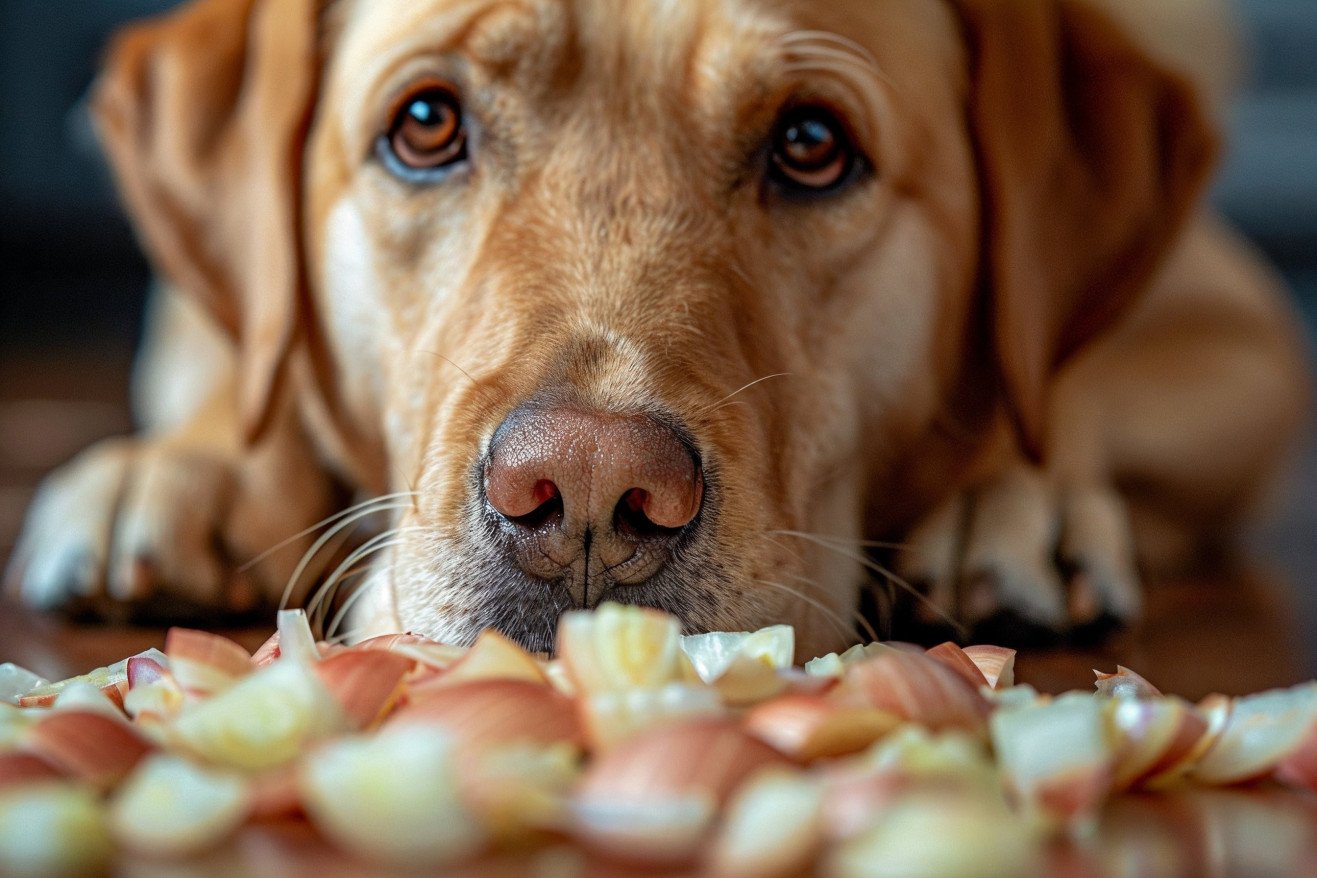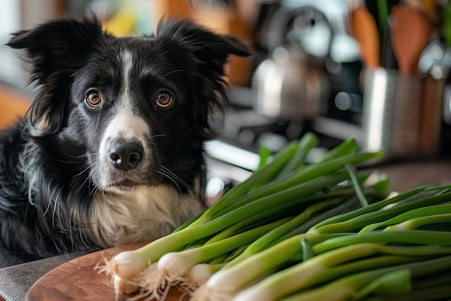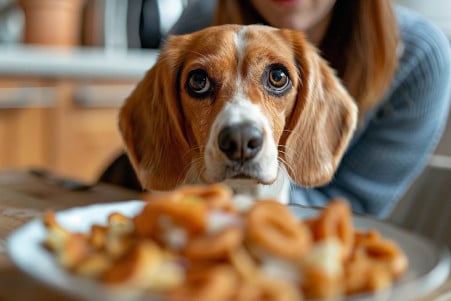My Dog Ate Onions: Risks and What to Do Now
25 May 2024 • Updated 24 May 2024

Did you just find your dog eating onions and now you're worried about the potential side effects? If your dog ate a small piece of onion, don't worry - small amounts are usually not life-threatening, but can still cause gastrointestinal upset like vomiting or diarrhea. Keep an eye on your dog and call your vet if you notice any symptoms, but don't try to make your dog throw up unless your vet tells you to.
Onions have compounds that can cause damage to a dog's red blood cells, which can eventually lead to anemia if enough is consumed over a long enough period of time. Here's exactly what to do and what to look out for, with information from veterinarians and studies on onion toxicity in dogs. Knowing what to expect can help you make sure you're doing everything you can to help your dog through this.
What should I do if my dog ate a small piece of onion?
Onion Toxicity in Dogs: What to Know About the Risks and Symptoms
Onions contain sulfur compounds like N-propyl disulfide that can severely damage and even destroy a dog's red blood cells. This leads to a potentially life-threatening condition called hemolytic anemia. According to VCA Animal Hospitals, symptoms of onion toxicity in dogs may include vomiting, diarrhea, lethargy, weakness, pale gums, rapid breathing, and discolored urine as the red blood cells rupture.
The severity of the symptoms is largely based on the amount of onions consumed in relation to the dog's weight. Vetster notes that even a small amount can cause gastrointestinal issues, but larger amounts can lead to more severe and potentially life-threatening anemia. Some dogs, like Akitas and Shiba Inus, may be more prone to developing onion toxicity because of the way their red blood cells are structured.
One concerning thing about onion toxicity is that symptoms aren't always immediate. According to Whole Dog Journal, it can take between three and five days for symptoms to appear after a dog has eaten onions, so it's important to take action as soon as possible if you think your dog has consumed onions.
Calculating the Toxic Dose and Evaluating the Circumstances
The toxic dose of onions for dogs is often cited as 0.5% of the dog's body weight, but Pumpkin says that even smaller amounts can be toxic. According to the Merck Veterinary Manual, a dog's sensitivity to onion toxicosis can be affected by a number of factors, including the dog's size, age, breed, and health status.
It's important to evaluate the circumstances, including the amount of onion that was ingested and the timing of the ingestion. USA Today says that the type of onion that was ingested (raw, cooked, powdered) can also impact the severity of the toxicity. It's also important to make sure the dog can't access any more onions and to keep a close eye on them for any signs of illness, especially since symptoms may not show up right away.
What to Do if Your Dog Has Eaten Onions
If your dog has eaten onions, no matter how much, seek professional veterinary help immediately. According to Dr. Phillips Animal Hospital, do not try to treat your dog at home, as this can make things worse or delay proper treatment. Instead, follow your vet's treatment plan, which may include inducing vomiting, giving activated charcoal, or providing supportive care.
To help prevent your dog from eating onions and other potentially harmful foods, Purina suggests keeping onions in a secure location and cleaning up any spills right away. You should also be ready to give your vet information about how much onion your dog ate, when they ate it, and what symptoms they're showing, as this can help them determine the best course of action.
Veterinary Care and Monitoring for Onion Toxicity
If onion toxicity is suspected, veterinary care may include vomiting induction and activated charcoal administration to eliminate any remaining onion in the dog's body, as stated by Kingsdale Animal Hospital. Depending on the severity of the case, dogs may also need supportive care, including the administration of fluids and oxygen and monitoring for anemia.
In more serious situations, Pet Poison Helpline explains that blood transfusions may be necessary to treat the resulting anemia. As noted by 4 Paws Veterinary Hospital, it will be important to conduct regular blood tests and monitor for symptoms like lethargy, pale gums, and discolored urine during the recovery process.
Depending on the dog's reaction and the progression of their symptoms, the dog may need to be monitored and the treatment plan may need to be adjusted. It's important that the dog receives timely and appropriate care from a veterinarian to ensure that they recover and don't experience any long-term issues.
Potential Long-Term Effects and Recovery Outlook
Most dogs will make a full recovery from onion toxicity with the right treatment, especially if the amount of onions consumed was small. However, in more severe cases or if treatment is delayed, onion toxicity can have long-term consequences or even be fatal, according to the Merck Veterinary Manual.
One of the potential risks is organ damage, especially to the kidneys, if the anemia that results from onion toxicity is severe and prolonged, according to the 4 Paws Veterinary Hospital. Some dogs may also have symptoms that persist for a period of time, such as weakness or a loss of appetite. It is important to make sure that you follow your vet's instructions for aftercare and monitoring to ensure that your dog makes a full recovery and to catch any potential issues.
How to Avoid Onion Toxicity: Protecting Your Dog
The best way to avoid onion toxicity in dogs is to never give them onions, garlic, or other Allium plants, says the PDSA. Purina suggests keeping onions and other potentially harmful foods in a safe and secure location away from pets. It's also important to clean up any onion-containing spills or crumbs immediately to prevent dogs from eating them.
When cooking with onions, BeChewy warns that you should be careful and make sure your dog can't get to any leftovers or scraps. It's also important to make sure that everyone in your household and any pet caregivers know about the dangers of onions.
These measures can help ensure that dogs are never exposed to onions and reduce the likelihood of onion toxicity.
Conclusion: Make Sure You're Keeping Your Dog Safe and Healthy
Onions, even in small amounts, can be very dangerous to dogs and should never be given to them on purpose. If your dog has accidentally ingested onions, it's important to get them to the vet as soon as possible and follow the treatment plan that's recommended.
Watching for symptoms, preventing further exposure, and providing supportive care are all important parts of making sure your dog gets better. By knowing the risks and taking the right steps, pet owners can make sure their dogs are safe and healthy. Most cases of onion toxicity in dogs can be managed and resolved when the right steps are taken.


